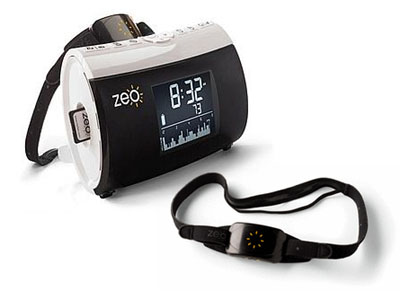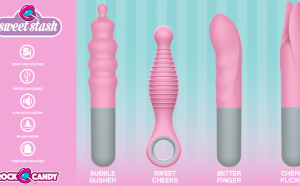by Bianca Bosker
Silicon Valley entrepreneur Dave Asprey put himself on a strict orgasm diet last year — not because of religious beliefs or health concerns, but in pursuit of data that would reveal the optimal rate of ejaculation to maximize well-being. For several months, he allowed himself no more than a single ejaculation every eight days. He then graphed orgasm frequency against his overall life satisfaction, measured daily, to see how one affected the other.
Asprey’s significant others haven’t escaped his drive for data. At night, he and his wife strap Zeo sleep bands on their foreheads to track the quality of their rest, and they have started sleeping in separate beds several nights a week to avoid disturbing each other’s rest. He encourages husbands to track their wives’ ovulation cycles along with the frequency of their fights to better understand what disrupts marital bliss. In a previous relationship, Asprey tracked everything his girlfriend ingested, then correlated it with her moods.
The goal is self and spouse improvement by gathering personal data that can reveal unseen patterns and bad habits, explains Asprey, who runs a blog chronicling his efforts to “hack” his body and mind.
“Data brings you the power to change your relationship, and that’s huge,” Asprey said.
As sophisticated computing insinuates itself into every slice of life, many have bemoaned it as a privacy-violating intrusion. Yet some data-obsessed couples are embracing it as a productive means of surveillance in their relationship, and have taken to hooking spouses up to sensors, weighing wives with WiFi-enabled scales and even recording lovers’ tiffs with iPhones.
Asprey’s data-intensive lifestyle puts him in good company among devotees of the quantified self movement, which advocates “self knowledge through self-tracking.” Members have traditionally used electronic and analog tools to measure, then tweak, their own habits. But a subset of quantified self-ers are now training their trackers on their significant others — the quantified spouse movement, if you will.
Seven in ten American adults are “trackers” who monitor health information, such as sleep or diet, for themselves or a loved one, and nearly a quarter of trackers are sharing data with a significant other, according to a recent report from the Pew Research Center.
“For 17 years, the web has been able to help people find love on a proliferating number of dating sites,” said Gary Krane, the co-founder of CoupleWise, a site that lets couples track their satisfaction and needs. “The technology that helps people keep the love they find has largely been ignored.”
Yet even as these connected devices reveal more personal details about couples’ lives, the tools also open up new venues for surveillance, accountability and competition within personal relationships. And individuals needn’t be formal followers of the quantified self movement to find easy ways to spy on their significant others.
Christine, a 20-something New Yorker who asked to be identified by her first name, had plans to move in with her boyfriend, and the couple spent every minute outside of work searching for a new apartment — or so Christine thought. She logged into the Kindle account they shared to read an e-book she and her boyfriend had started in tandem, only to discover he’d plowed several hundred pages ahead, while she was still just two chapters in. Thanks to data from the Kindle e-reader, Christine realized that while she’d been hunting for homes, he’d been kicking up his feet with a book.
Laurie Hick, an artist who tracks her and her husband’s weight and sleep habits, is able to monitor her husband’s habits even at a distance thanks to a web-connected scale that uploads its measurements to an app both spouses can access. When Hick’s husband spends a few weeks without her at their Austin home, she can check her app to see whether he’s been sticking to a healthy diet — or binging on burritos and barbeque.
Some couples say the data they collect actually helps them to be more respectful of a spouse’s state and needs. Lisa and Joe Betts-LaCroix have an adopted an arsenal of mutual-surveillance tools that include the Zeo sleep band; an infrared camera to monitor their tossing and turning at night; and a WiFi-connected scale. The couple has also tried Krane’s CoupleWise, and is embarking on a three-phase relationship experiment of their own design that will measure, in real-time, how each spouse’s actions affect the other’s happiness.
Like body language, the digital data clues Joe and Lisa in to how the other is feeling.
“If I see Lisa get a sleep score of 48 [a low score implying a poor night’s sleep], I’ll think, ‘I’ll walk on eggshells around you today because a 48 means you could possibly be a little volatile,’” explained Joe, who is the executive director of Health Extension, an organization seeking to extend the human lifespan. “Sometimes I can look at it [Lisa’s weight] and say, ‘Wow are you stressed out lately? Your weight is going up,’ or ‘Wow, you were really sick, look how much it dipped.’”
“It informs our conversations about each other,” added Lisa, who organizes meetings for quantified self-ers in Silicon Valley.
Elliott Hedman, a graduate student at the MIT Media Lab, affixed skin conductance sensors to a date he took to a classical music concert in order to track her physiological reaction to the music. The data, which revealed the young woman’s lack of enthusiasm for the concert, allowed for a more honest and specific conversation about the experience than would have been possible without it, Hedman argued. Instead of exchanging generic pleasantries about the concert or masking their true opinions to spare the other’s feelings, they could dive into details and use data — an impartial judge — to be straightforward about how they’d each perceived the event.
“Even more than discovering hidden secrets, the data is actually just providing a tool for communication,” said Hedman. “When we’re talking about a graph — about data and numbers, not personal opinions — we can be more honest with each other. It’s less accusing. It removes the personal feelings.”
Other quantified self couples echo Hedman’s explanation, saying that apps and trackers can offer an unbiased, third-party arbiter to offset subjective emotions. Asprey notes he’s friendly with a couple who records their arguments with an iPhone or video camera. Returning to the recording — or just knowing that it’s possible — offers a way to resolve conflicts that might arise from miscommunication.
“Measuring gives you a way to convey how you feel in a way that’s more believable,” says Hick. “It’s like you’ve got this level of credibility that’s almost indisputable. You’ve got this other credible entity – this personal fact-checker — and people don’t argue the facts.”
This presents a key tension: Aren’t emotions — those messy feelings of lust, attraction and love — the very foundation of relationships? When does “removing the personal feelings” help settle an argument, and when does it remove all romance?
“Data is a lens that lets you see the world in a different perspective, but that doesn’t mean you can stop seeing the rest of the world,” said Hedman. “In the 21st century, data will be all around us, but interpreting it and using it to make better decisions, that’s where the real work comes in.”






